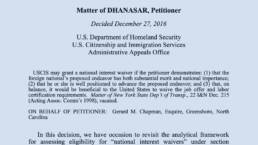The National Interest Waiver (NIW) stands as a beacon of opportunity for certain immigrants who wish to bypass the traditional labor certification process required for certain employment-based green cards. This waiver is particularly relevant for those who demonstrate that their work in the United States would be of national interest. The interpretation of “national interest” has evolved over time, notably through the landmark Matter of Dhanasar case in 2016.
Prior to Dhanasar, the criteria established by Matter of NYSDOT governed NIW applications, often creating hurdles for applicants due to its somewhat nebulous guidelines. However, the Matter of Dhanasar case, adjudicated by the Administrative Appeals Office (AAO) in 2016, set forth a new, more coherent framework for assessing NIW petitions. This case has not only simplified the application process but has also made the possibility of NIW approval more accessible to a broader spectrum of professionals and entrepreneurs.
The essence of Matter of Dhanasar pivots around three critical prongs, each designed to provide a clear pathway for determining eligibility for a National Interest Waiver.
- The proposed endeavor has substantial merit and national importance: The initial prong mandates that the applicant’s proposed work in the U.S. be of substantial merit and national importance. It emphasizes the qualitative impact of the proposed work across various sectors, including but not limited to science, technology, health, and the arts. The key consideration is not the domain of work, but its potential to contribute significantly to societal welfare or address pressing issues facing the nation.
- The applicant is well positioned to advance the proposed endeavor: This prong focuses on the applicant’s qualifications, achievements, and plans to assess their capability to successfully implement their proposed work. It requires a demonstration of the applicant’s preparedness and potential to make a meaningful impact in their field. Factors such as education, experience, a track record of success, and a clear, actionable plan for the future work in the United States are evaluated to determine if the applicant possesses a unique set of skills or knowledge that positions them to advance their endeavor effectively.
- On balance, waiving the job offer and labor certification requirements would benefit the United States: The third prong assesses the overall advantage to the United States of granting the waiver. This evaluation transcends the traditional labor market test of proving a lack of available U.S. workers. Instead, it considers whether, on balance, the applicant’s contributions to the U.S. would justify waiving the job offer and labor certification requirements. This criterion is met when it can be shown that the applicant’s work addresses a matter of national importance in such a way that the benefits of their continued work in the U.S. significantly outweigh the interests served by protecting domestic labor through the labor certification process.
The Matter of Dhanasar case has undeniably broadened the horizon for NIW applicants, allowing for a more inclusive and diverse pool of talents to qualify under the national interest umbrella. Its flexible framework encourages individuals from a wide array of fields to apply, provided they can demonstrate how their work serves the U.S. national interest in a significant way.
For professionals, entrepreneurs, and researchers eyeing the NIW as their pathway to a green card, understanding the nuances of the Dhanasar criteria is paramount. It’s not just about showcasing your accomplishments but articulating the broader impact of your work on the U.S. Contact us today if you need help!
Ready to have Berardi on your side?
Whether you’re a business looking to hire or a professional hoping to relocate, immigration law can be complicated. But you don’t have to do it alone. Put our experience to work for you.



